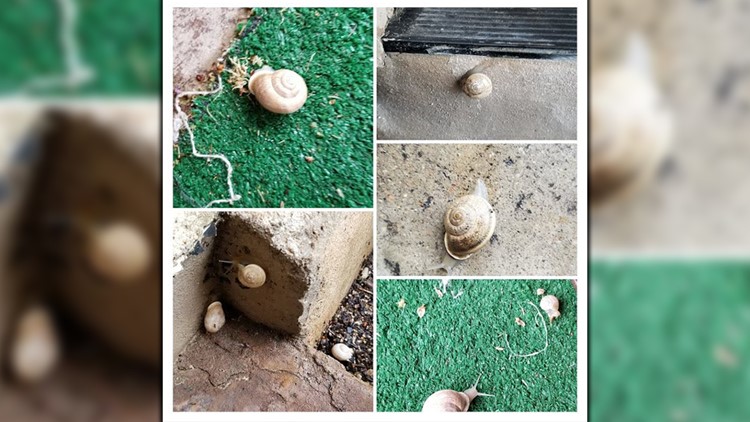AUSTIN -- After a downpour of overnight rain, some KVUE viewers woke up to several slimy, slow-moving visitors outside their homes. We're talking about snails, y'all.
To find out why, we reached out to the Texas Parks and Wildlife Department, who referred us to their agency invertebrate biologist, Ben Hutchins. He said the wet season is prime time for the little shell dwellers.
"Snails are very susceptible to desiccation [drying out], so they tend to avoid coming out on hot dry days and can be seen most during/after the rain and particularly at night or when it is cloudy and cool," Hutchins said.
On those dry days, he said the slimy creatures have a multitude of methods for staying moist.
"Some snails dig into the ground, others crawl into thick accumulations of leaf litter or under/inside fallen logs, or deep into piles of rock and leaf litter," Hutchins reported. "Snails will often seal up their shells to avoid water loss and they can remain in a state of suspended animation for long periods of time (several years at a time for some species)."
Hutchins said there have been 56 species of terrestrial snails recorded in Travis County. As for aquatic snails, he said the state has recorded dozens of species. While there may be about 230 terrestrial species in the state, the biologist said the vast majority are harmless, usually only causing a minor nuisance by feeding on garden plants -- or even other snail species.
"There is very little reason to try and eradicate snails," Hutchins said. "The exceptions are several non-native species that have made their way into the state. Some, like garden snails, can reach high densities in urban environments and could potentially cause more damage in the garden. Others, like the decollate snail, eat other native snail species."
If you've heard the myth that there are giant African land snails in Texas that carry parasites that are dangerous to humans, Hutchins said you shouldn't bug out.
"The culprit was either the native wolf snail or rabdotus snail," he reported. "Giant African land snails have not been confirmed in Texas, although they are present in one or a few other states."
The Texas Parks and Wildlife Department has a page where you can share your observations on the terrestrial mollusks of Texas right here.



